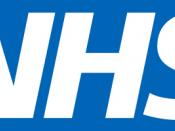REFORMING THE NHS IN THE 1990s . SUCCESS OR FAILURE ?
The health care system of many countries throughout the developed world are being reformed and restructed. In the current ferment of change and experimentation, the British Health service is in the forefront. A pioneering concept in 1948, the NHS remained the prime example of a centrally planned and funded public health servive. In 1990 it again pioneered a new model of organising and delierening health services.
By the late 1980s, the NHS was suffering from a severe lack of resouces. This was the result of three factors. Firstly, becouse of the policies of the government ,which was cutting back on public expenditure. Secondly, becouse of the increasing numbers of elderly with their demands on the health services and thirdly, the increasing demands for higher standards of health. The situation was so bad that districts were not paying their bills, and operations were being cancelled.
Waiting lists were increasing rapidly. As a result, a review of the NHS was announced.
The Government Review produced a list of the strengths and weaknesses of the NHS, and suggested that one of the main problems lay in the lack of incentives for emploees of the NHS to make savings and be more efficient. The government was strongly influenced by an economist, Enthoven, who argued that by introducing an internal market to the NHS, managers would be encouraged to become more efficient and without extra spending many of the NHS could be solved. He claimed that " there is nothing like a competitive market to motivate quality and economy of service "( Carrier, 1998, p.145). What Enthoven meant by the internal market, was that each hospital or community care unit would compete against others to win contracts to care for specified numbers of patients.



NHS
Informative essay and seems to be well researched. It would be interesting to have some specific measure of the acceptance of NHS such as an opinion poll at the end of the essay rather than just the statement that the NHS remains popular. Specificty is always better.
9 out of 9 people found this comment useful.